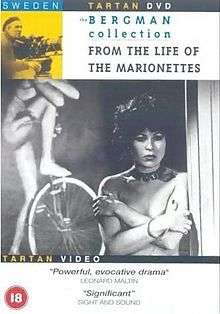From the Life of the Marionettes
| From the Life of the Marionettes | |
|---|---|
 | |
| Directed by | Ingmar Bergman |
| Produced by |
Konrad Wendlandt Horst Wendlandt Ingmar Bergman |
| Written by | Ingmar Bergman |
| Starring |
Robert Atzorn Heinz Bennent Martin Benrath Toni Berger Christine Buchegger |
| Music by | Rolf A. Wilhelm |
| Cinematography | Sven Nykvist |
| Edited by | Petra von Oelffen |
Release dates |
3 November 1980 (German TV) 7 November 1980 (German cinema) |
Running time | 104 min |
| Country |
West Germany Sweden |
| Language | German |
From the Life of the Marionettes (German: Aus dem Leben der Marionetten) is a 1980 film directed by Ingmar Bergman. The film was produced in West Germany with a German language screenplay and soundtrack while Bergman was in "tax exile" from his native Sweden. It is filmed in black and white apart from two colour sequences at the beginning and end of the movie. It is set in Munich. The title is a quotation excerpted from a passage in The Adventures of Pinocchio by Carlo Collodi:
- "Most unfortunately in the lives of the Marionettes there is always a BUT that spoils everything".
Unlike Collodi's story, however, Bergman's is unremittingly bleak in tone.
The film charts the disintegration of the relationship of Katarina and Peter Egermann, the feuding couple seen briefly in Bergman's earlier Scenes From a Marriage. As Katarina seeks other lovers, the emotionally repressed and despondent Peter descends into neuroses, eventually leading him to tearfully murder a prostitute (played by Rita Russek), with the same name as his wife, at a Munich peep show before sodomising her dead body. In the closing sequence he is incarcerated in a mental asylum. An odd counterpoint to the depressing tone of the film is the sprightly disco soundtrack over the end credits.
Production
The film was shot in the Bavaria Film Studios in Munich from October to December 1979, with the exception of the bar scene, which was a later addition, filmed in Minneapolis, Minnesota in early 1980. The film begins in color, but all the flashbacks are in black and white. The film was originally made for television and had its TV premiere on German ZDF on 3 November 1980. The very first showing, however, was at a small film festival in Oxford 13 July 1980, followed by festival showings in Paris[1] and the Netherlands[2] in October 1980. After the German TV premiere the film went on general cinema release, starting with Zoo Palast in Berlin on 7 November 1980.
Cast
- Robert Atzorn – Peter Egermann
- Heinz Bennent – Arthur Brenner
- Martin Benrath – Mogens Jensen
- Toni Berger – The Guard
- Christine Buchegger – Katarina Egerman
- Gaby Dohm – Secretary
- Erwin Faber
- Lola Müthel – Cordelia Egermann
- Ruth Olafs – Nurse
- Karl-Heinz Pelser – The Interrogator
- Rita Russek – Ka
- Walter Schmidinger – Tim
- Michel Wagner - The Bartender
Response
The film opened to good and occasional cautionary reviews. Many felt Bergman's film was too heavy to be considered real drama, but they did like the performances of the German cast, including Robert Atzorn.
The film was nominated for Best Foreign Language Film of the year by the U.S. National Board of Review.[3]
References
- ↑ Ingmar Bergman Face to Face: Production notes From the Life of the Marionettes Retrieved 2011-07-11
- ↑ IMDb: Release dates for From the Life of the Marionettes Retrieved 2011-07-11
- ↑ "1980 Award Winners". National Board of Review of Motion Pictures. 2016. Retrieved 2 December 2016.
External links
- Aus dem Leben der Marionetten at the Internet Movie Database
- From the Life of the Marionettes at AllMovie
- From the Life of the Marionettes at the Swedish Film Institute Database

- Review in New York Times, June 30, 1981 Retrieved 2011-07-11
- Ingmar Bergman Face to Face: From the Life of the Marionettes Retrieved 2011-07-11